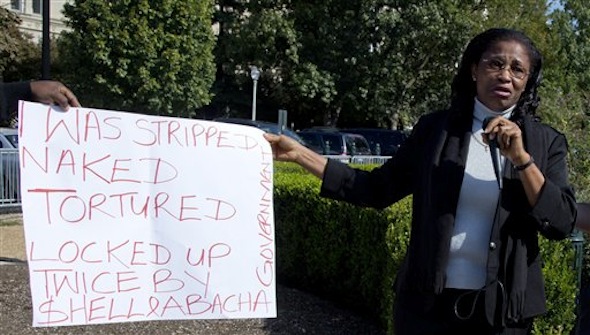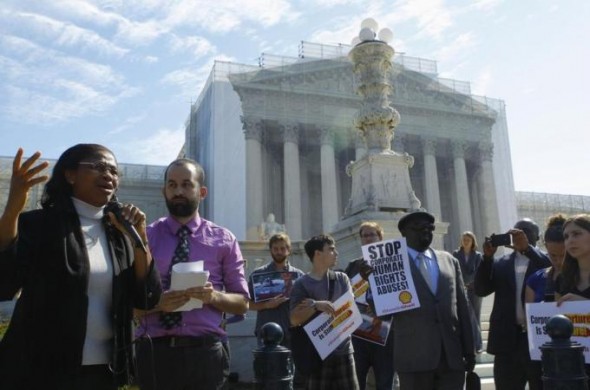Kiobel v. Shell: U.S. Supreme Court issues decision
Today the U.S. Supreme Court issued its decision in the Kiobel v. Shell case, limiting the courts’ ability to hear claims of human rights abuses committed abroad.
Lawrence Hurley of Reuters calls the disappointing decision, “a major victory for multinational companies,” adding that “the ruling is a major win for multinationals such as Royal Dutch that do business in the developing world and become embroiled in local political controversies.
“Those companies, which are still subject to lawsuits in foreign courts, fear U.S. courts because of the possibility of large damage awards,” Hurley writes. He goes on to note that, “The ruling is likely to affect other cases, including those involving similar claims against Anglo-Australian mining company Rio Tinto Plc over its conduct in Papua New Guinea; Exxon Mobil Corp over its activity in Indonesia; and Daimler AG concerning alleged abuses in Argentina. The companies have all vigorously contested the claims.”
Human Rights First goes further, saying the Kiobel ruling “undermines U.S. leadership on human rights.”
In its press release, the organization writes, “Today in its decision in Kiobel v. Royal Dutch Petroleum, the Supreme Court gutted the Alien Tort Statute (ATS), a law that has been on the books for more than 200 years and for the last 30 years has been a critical avenue to hold serious human rights violators accountable. In a decision that will undermine the United States’ status as a leader on human rights, the Justices unanimously decided that the victims of the gross human rights violations alleged in this case were not entitled to relief under the ATS. Furthermore, a majority of the Court ruled more broadly that the ATS does not apply to human rights violations committed in other countries.
Some good background reading while waiting for the Kiobel decision
“This may be the week that the Supreme Court finally issues a decision in the landmark Alien Tort Statute case, Kiobel v. Royal Dutch Petroleum,” international law expert John Bellinger wrote on March 24th. “Whether or not a decision is issued this week,” he adds, “most Kiobel watchers believe that the Court will rule in favor of Shell. But on what basis?”
He goes on to outline various legal theories that may persuade the judges (and leave human rights activists discouraged). Read the post here: Will the Supreme Court Issue a Decision in Kiobel This Week?
We’re still waiting for the decision and in the meantime I’m posting an opinion piece by Lauren Carasik, Director of the International Human Rights Clinic at Western New England University School of Law. This piece originally appeared on the Al Jazeera website. I’m posting the article in its entirety below as it gives a good overview of this case and the larger issue of transnational corporate liability for human rights abuses.
Indeed, as the Center for Justice and Accountability (CJA) writes in its overview of the Kiobel case, “The stakes are extremely high because the ATS is the only avenue for most human rights victims to hold perpetrators accountable. In the home countries of many victims, there is no legal forum available to seek justice. The Supreme Court is considering removing the U.S. as their last resort.
U.S. Supreme Court: Shell Nigeria gets a boost from Obama administration
Democracy Now! May 26, 2009 report on opening of trial in NY federal court over Shell’s role in 1995 execution of human rights activist Ken Saro-Wiwa
Marco Simons, Legal Director at Earth Rights International, has recently written an article, US government sides with Shell over victims of crimes against humanity, which I’m posting below in its entirety.
Shell had asked the U.S. Supreme Court to rule the company can’t be sued by Nigerians seeking damages for torture and murders committed by the national government in the early 1990s. With a U.S. government brief that supports Shell’s position, where does this leave Nigerians? The U.S. brief suggests that the Nigerians should seek redress in their own courts, as the human rights abuses occurred in Nigeria and not the U.S. This is a chilling message.




